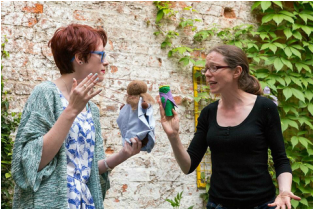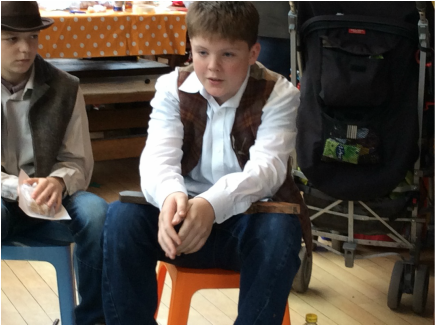Informal mentoring
Through my practice in various settings, I have come into contact with a number of particularly talented and enthusiastic young storytellers, for whom an ongoing mentoring relationship proved possible and valuable. I was able to help them develop their storytelling and other artistic skills, provide them with storytelling resources, and offer them opportunities to perform or work with other artists and facilitators based at York Theatre Royal. I learnt in turn from their styles of storytelling, and what they chose to express through story – as my collaboration with young spoken word artist Imogen Godwin illustrates. I give here the additional example of Sam and Louis (not their real names).
Sam* and Louis*Sam* and Louis* were pupils in different year groups of the ‘intervention’ classes at City School, who took leading roles in my storytelling sessions there. Both had their own repertoire of own family stories which they shared when these seemed relevant to the stories I brought to their respective classes; both also enjoyed retelling my stories and developing their own skilful interpretations of them. Sam in particular was also notably interested in the process of storytelling and often engaged me in discussion about how stories ‘work’ in the human mind. Louis was conscious of his responsibility as inheritor of his great-grandfather’s stories of wartime.
As the Theatre was preparing for its ‘Takeover’ Festival, when young people aged 12-25 take over all aspects of the running of the theatre, I invited Sam and Louis to work with me to prepare a joint performance for children in the festival. Although neither had been to the theatre before, and they did not initially know each other, they agreed. They decided in addition to join the committee of Takeover volunteers, and join in their drama workshops. Each of the boys then developed their own stories for performance, with my feedback, over several rehearsals. Rather than folktales or true stories, they chose to perform fantastical and funny stories of their own invention, which they felt were more suitable to an audience of children. We visited the theatre’s costume hire, where they chose outfits they felt suitable to storytellers. |
They performed to enthusiastic audiences in the challenging and noisy environment of the theatre foyer, as well as to one of YTR’s youth theatre groups. Their families and one of their teachers came to watch them perform, and took up the theatre’s offer of free tickets to an evening show as a gesture of thanks for the boys’ contribution. Both boys went on to study GCSE drama and remained in touch with me and with the theatre for some time.
|

In other mentorships, I supported a former youth theatre member to develop his performance practice as a storyteller; and organised work experience, theatre trips, Arts Awards and other informal arts opportunities for former Maple House inpatients.
Indeed, I came to feel that the ability to form mentoring relationships was a key strength of this practice research, embedded in the performance environment of the theatre and the learning environment of the university. In part, it represented ethnographic reciprocity; moreover, making clear my ongoing availability to those who wished to pursue their interest in storytelling altered the disposition of my practice within settings, making young people's roles more fluid.
Indeed, I came to feel that the ability to form mentoring relationships was a key strength of this practice research, embedded in the performance environment of the theatre and the learning environment of the university. In part, it represented ethnographic reciprocity; moreover, making clear my ongoing availability to those who wished to pursue their interest in storytelling altered the disposition of my practice within settings, making young people's roles more fluid.
